Keeping Calm in Competitive Sports: How to Train Your Mind, Body, and Chemistry for Peak Performance
Introduction
Whether you’re an athlete in the ring, on the field, or in the gym, one truth never changes — the mind is the ultimate performance muscle.
You can train for strength, speed, and skill, but when competition hits and adrenaline spikes, what separates the winners from the rest isn’t just physical ability — it’s emotional control.
Keeping calm in competitive sports isn’t about suppressing emotion. It’s about channeling energy, staying composed under pressure, and using physiological and psychological tools to maintain clarity when others unravel.
The greats — from Michael Jordan to Novak Djokovic to Simone Biles — all share a quiet superpower: the ability to self-regulate under stress.
This article explores the science of performance anxiety, how stress hormones affect your focus and reaction time, and how nutrition, supplements, and mental training can help you stay in your zone when everything’s on the line 🧘💪.
Looking for supplements for This? Click here.
The Physiology of Competitive Stress ⚡

When the whistle blows, the bell rings, or the crowd roars, your body instantly shifts into fight-or-flight mode.
The amygdala, your brain’s emotional alarm system, activates the sympathetic nervous system. Adrenaline and cortisol flood your bloodstream, increasing heart rate, blood flow, and energy availability.
In short bursts, this is beneficial — it sharpens reflexes, increases oxygen to muscles, and enhances alertness. But if stress stays elevated too long, it becomes counterproductive.
Cortisol overload narrows focus, stiffens coordination, and interferes with motor learning. Your breathing becomes shallow, your mind speeds up, and fine motor control — the very thing precision athletes rely on — starts to break down.
That’s why staying calm isn’t a luxury. It’s a competitive edge.
The best athletes learn to stay in the “optimal arousal zone” — alert but relaxed, focused but fluid.
Why Stress Affects Performance 🧠
When you’re anxious before a big match, it’s not “just in your head.” It’s in your body chemistry.
High cortisol suppresses dopamine and serotonin, the neurotransmitters responsible for focus, confidence, and motivation. It also reduces blood flow to the prefrontal cortex — the part of your brain that makes quick decisions and stays composed.
That’s why in moments of pressure, you might make uncharacteristic mistakes, freeze, or doubt your training.
Calm athletes, on the other hand, have trained their nervous system to switch quickly from stress activation to recovery. Their breath, heart rate, and neurochemistry stay balanced even in chaos.
This balance is both trainable and nourishable — through supplements, breathwork, and mindset conditioning.
The Mind–Body Connection in Sport 🧘
Your mental state affects physical performance more than most realize.
When you’re calm, your muscles move efficiently, reaction time improves, and your endurance lasts longer because you’re not wasting energy on tension.
When you’re anxious, muscles tighten and oxygen flow drops — leading to early fatigue and poor timing.
The goal isn’t to eliminate adrenaline, but to harness it. Controlled adrenaline gives you intensity without panic.
That’s the sweet spot — flow state — where your mind is silent, your movements effortless, and time seems to slow down.
To reach that state more consistently, athletes can support both their psychology and their biochemistry.
Supplements That Support Calm Under Pressure 🌿🏋️
While training and recovery are essential, certain nutrients help regulate the stress response and enhance focus naturally. These compounds support the nervous system, modulate cortisol, and sharpen the mind without sedating the body.
L-Theanine: Calm Focus for Competition 🍵
L-theanine, the amino acid found in green tea, increases alpha brain waves — the rhythm of relaxed alertness.
It reduces cortisol and heart rate variability under pressure while improving attention and reaction time.
For athletes, L-theanine creates that mental clarity where focus is sharp but stress is muted. It’s ideal before competition, especially when paired with low-dose caffeine (for alertness without jitters).
A dose of 100–200 mg about 30 minutes before an event can make a noticeable difference in composure and precision.
Magnesium: The Anti-Stress Mineral 💪
Magnesium supports over 300 cellular functions, including muscle relaxation, ATP production, and neurotransmitter regulation.
Under intense physical or emotional stress, magnesium levels drop — leading to cramps, irritability, and poor recovery.
Supplementing with magnesium glycinate or magnesium malate helps calm nerves, improve sleep, and enhance endurance.
It’s the mineral of patience and fluid motion — essential for keeping body and mind synchronized during high-stress moments.
Rhodiola Rosea: Adaptogenic Stamina 🌄
Rhodiola is a powerful adaptogen — an herb that increases resilience to stress without overstimulating.
It helps balance cortisol, sustain energy, and prevent the mental fatigue that leads to mistakes late in competition.
Rhodiola improves endurance, oxygen efficiency, and focus under pressure — making it especially useful for fighters, endurance athletes, and anyone who competes under physical and emotional load.
Taken regularly, it conditions the nervous system to recover faster from stress spikes, both in training and competition.
Ashwagandha: Cortisol Control and Centered Energy 🌾
Ashwagandha modulates cortisol production, stabilizes mood, and enhances reaction time by improving GABA and dopamine activity.
It doesn’t make you sleepy; it balances your energy so you stay composed under pressure.
For athletes prone to pre-competition jitters or overtraining, ashwagandha provides calm focus without fatigue.
A dose of 300–600 mg of standardized extract daily supports both performance and recovery.
Omega-3 Fatty Acids: Brain Flexibility 🧠
Omega-3s (EPA and DHA) improve communication between neurons and reduce inflammation caused by intense training.
They enhance focus, decision-making speed, and emotional stability — three critical components of high-pressure performance.
Athletes who take omega-3s regularly often report clearer thinking and smoother recovery between competitions.
They’re also linked to better sleep and reduced post-competition soreness, further supporting long-term calm.
B-Complex Vitamins: Energy Without Anxiety ⚡
B vitamins convert food into energy and regulate neurotransmitters like serotonin and dopamine.
Deficiency in these vitamins can cause fatigue, irritability, and poor focus — all of which magnify stress.
A balanced B-complex supplement keeps your brain sharp and your energy consistent throughout long training sessions or multi-day events.
CoQ10: Cellular Power and Calm Endurance 🔋
Coenzyme Q10 fuels mitochondrial energy and protects cells from oxidative stress — essential for athletes performing at high intensity.
It helps sustain energy output while buffering cortisol spikes.
Athletes who take CoQ10 report fewer energy crashes and better focus under physical strain — the perfect blend of power and patience.
Looking for supplements for This? Click here.
Breathwork and the Athlete’s Calm 🌬️
Your breath is your fastest way to regulate stress — and it’s completely within your control.
When adrenaline spikes, breathing becomes shallow, signaling danger to the brain. Slowing your breath does the opposite — it activates the vagus nerve, lowering heart rate and cortisol.
Here’s a simple breathwork technique used by elite performers:
Inhale deeply through your nose for four seconds.
Hold for two seconds.
Exhale slowly through your mouth for six.
Repeat for one minute before a game, round, or lift.
This tells your body, I’m safe, I’m ready.
Practicing daily breathwork improves heart rate variability (HRV) — a marker of nervous system resilience. The higher your HRV, the faster you recover from stress spikes during competition.
Want to try Breathwork? Click Here.
Mindset Training: Turning Stress Into Power 💥
Performance psychology teaches that stress is neutral — it’s your interpretation that determines its effect.
Instead of labeling nerves as fear, reframe them as energy. The adrenaline flooding your system is your body preparing you for excellence.
The difference between anxiety and excitement is breath and interpretation.
Calm athletes don’t deny emotion — they alchemize it. They feel the surge and channel it into focus rather than panic.
Visualization also helps. Imagine yourself staying composed when things go wrong — missing a shot, taking a hit, losing a round. Rehearse returning to calm in your mind until it becomes automatic.
Your body doesn’t distinguish between real and vividly imagined experiences — you’re training neural resilience.
The Role of Recovery in Staying Calm 😴
Calmness isn’t only about what happens in the moment — it’s built in recovery.
If you’re under-slept, underfed, or overtrained, your nervous system becomes hypersensitive. Small frustrations feel huge. Reaction times slow.
Nutrients like magnesium, omega-3s, and CoQ10 support recovery by reducing oxidative stress and restoring neurotransmitter balance.
Sleep also resets your stress response. During deep sleep, cortisol levels drop and growth hormone rises — repairing muscles and your emotional stability.
Without proper rest, no amount of mindset training can override biology.
Emotional Awareness and Self-Talk 🗣️
The calm athlete isn’t emotionless — they’re emotionally aware.
Notice how your body feels before competition. Tension in the neck? Racing heartbeat? Dry mouth? That’s not failure — it’s your system mobilizing energy.
Acknowledging sensations instead of fighting them prevents panic.
Your self-talk matters too. Harsh inner criticism spikes cortisol; compassionate focus lowers it. Replace “don’t mess this up” with “stay sharp and flow.”
Positive self-regulation is an overlooked performance enhancer.
Nutrition for a Calm Mind 🍎
Food choices affect emotional stability just as much as supplements.
A high-sugar or processed-carb meal can cause blood sugar crashes that mimic anxiety. Instead, eat balanced meals with protein, complex carbohydrates, and healthy fats.
Foods rich in magnesium (spinach, almonds), omega-3s (salmon, chia seeds), and antioxidants (berries, turmeric) help the body neutralize stress-induced inflammation.
Hydration is equally vital. Even mild dehydration raises cortisol levels and reduces reaction speed — a critical disadvantage in competition.
The “Flow” State Explained 🌊
When you’re calm and present, you access flow — a state of effortless performance where action and awareness merge.
Flow occurs when challenge and skill are perfectly matched. Your mind stops overthinking, your body moves instinctively, and time slows down.
Supplements like L-theanine, magnesium, and Rhodiola help you reach this state faster by lowering cortisol and increasing dopamine — the neurotransmitter of motivation and reward.
Flow isn’t luck. It’s the chemistry of calm mastery.
When Pressure Peaks 🏆
Every athlete eventually faces a high-stakes moment — championship finals, weigh-ins, last rounds, or judgment calls.
The body may shake, heart pounding, thoughts racing. But this is your chance to practice biological control.
Breathe slower. Ground your feet. Focus on one cue — your breath, your stance, your mantra.
Remind yourself that this intensity is the same energy that drives victory — it’s just adrenaline, waiting to be directed.
When you trust your preparation, the noise fades, and clarity emerges.
Calm as a Competitive Advantage 🧩
Athletes who stay calm recover faster, think clearer, and perform more consistently.
Calm doesn’t mean complacent — it means centered in chaos. It’s the foundation for agility, reaction, and endurance.
While others waste energy fighting nerves, you conserve yours for precision and flow.
This is why modern sports psychology integrates supplements, breathwork, and neurotraining — because resilience isn’t just mental. It’s biological.
Building Your Calm Athlete Stack 🌿💪
A performance-focused calm routine might look like this:
Morning: Ashwagandha + B-complex + omega-3s
Pre-training: L-theanine (with or without green tea) + magnesium
Post-training: Rhodiola or CoQ10 for recovery
Combined with proper nutrition, hydration, and mindset practice, this stack strengthens your nervous system’s ability to stay calm, focused, and ready for anything.
Over time, calm becomes not a reaction, but your default state.
Final Thought: The Stillness Within Motion 🥇
In the heat of competition, calm isn’t passive — it’s active control.
It’s the boxer who breathes steadily between flurries. The sprinter who stays relaxed in the final stretch. The fighter who adapts mid-round instead of panicking.
Calm is power.
And when your brain chemistry, breath, and focus align — you move beyond anxiety into instinct, beyond thought into flow.
That’s the moment where sport becomes art — and stress becomes fuel for greatness.
Looking for online therapy ? Click Here.
References
Kennedy, D. O. (2016). “Cognitive nutrition and stress modulation.” Frontiers in Neuroscience, 10: 23.
Panossian, A., & Wikman, G. (2010). “Adaptogens in fatigue and stress.” Phytomedicine, 17(6): 481–493.
Kimura, K., et al. (2007). “L-theanine and stress resilience in performance.” Biological Psychology, 74(1): 39–45.
Boyle, N. B., et al. (2017). “Magnesium and cortisol regulation.” Nutrients, 9(5): 429.
Lopresti, A. L., et al. (2019). “Ashwagandha and athletic stress.” Medicine (Baltimore), 98(37): e17186.
Noreen, E. E., et al. (2010). “Rhodiola rosea and endurance.” Journal of Strength and Conditioning Research, 24(8): 2183–2191.
Hibbeln, J. R., et al. (2018). “Omega-3s and emotional regulation.” Progress in Neuro-Psychopharmacology & Biological Psychiatry, 80: 109–117.
Csikszentmihalyi, M. (1990). Flow: The Psychology of Optimal Experience. Harper & Row.
McEwen, B. S. (2007). “Stress and resilience in athletes.” Annals of the New York Academy of Sciences, 1113: 111–124.
Lanius, R. A., et al. (2018). The Neurobiology of Stress and Regulation. Routledge.
Related Posts
-
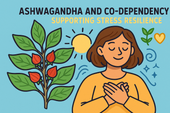
Ashwagandha and Co-Dependency: Supporting Stress Resilience
Stress is more than a feeling—it’s a full-body signal that your system is overwhelmed. When the mind races and the body tenses, your hormones, breathing, and focus all shift into survival mode. Chronic stress doesn’t just affect emotions—it reshapes your nervous system, drains your energy, and clouds your clarity. Learning to understand and manage stress gently is the first step toward peace, balance, and true recovery. 🌿💫
-

Why Co-Dependency Feels Draining: Adrenal Fatigue and Supplements That Help
The adrenal glands are small but powerful organs that sit above your kidneys, acting as your body’s built-in stress managers. They produce hormones like cortisol and adrenaline that help regulate energy, mood, and resilience. When they’re overworked from chronic stress or emotional exhaustion, fatigue and imbalance follow. Supporting adrenal health naturally can help restore calm, energy, and hormonal balance. 🌿⚡
-

The Link Between Anxiety, Co-Dependency, and Natural Support
Anxiety feels like living in constant alert mode—your heart races, your thoughts loop, and your body can’t find peace. It’s the nervous system’s way of preparing for danger, even when none exists. Understanding what’s happening in your mind and body is the first step toward calming the storm and restoring balance. 🌿💫
-

Supplements That Support Dopamine and Serotonin in Co-Dependent Patterns
Serotonin is the neurotransmitter of calm, confidence, and contentment. When it’s balanced, you feel peaceful and emotionally grounded. When it’s low, anxiety, mood swings, and emotional dependence take over. By understanding serotonin’s role in emotional health—and how to support it naturally—you can rebuild inner stability, improve relationships, and cultivate lasting happiness from within. 🌞💫
-

How Emotional Exhaustion in Codependency Impacts the Nervous System
The nervous system is the body’s communication network, connecting the brain to every organ and muscle. It regulates stress, mood, and emotion through a delicate balance of electrical and chemical signals. When overwhelmed, it can become dysregulated—leading to fatigue, anxiety, and emotional imbalance. Understanding how to calm and strengthen the nervous system is key to healing from chronic stress and emotional burnout. ⚡🌿
-

What Is Co-Dependency? The Role of Brain Chemistry and Stress
Stress is more than a feeling—it’s a full-body experience that begins in the brain and ripples through every cell. When cortisol surges and the nervous system stays on alert, your body can’t rest or recover. Over time, this constant tension affects energy, focus, mood, and even immune health. Understanding stress chemistry is the first step toward breaking free from burnout and finding calm again. 🌿
-

Creating a Supplement Stack for Motivation, Energy, and Anti-Procrastination
Motivation is the fuel behind every meaningful achievement—but it’s not just about willpower. It’s a mix of mindset, brain chemistry, and momentum. When energy, focus, and purpose align, action feels natural instead of forced. Learn how to harness motivation as a daily state, not a fleeting feeling.
-

Supplements for Building Consistency and Reducing Chronic Procrastination
Biochemistry is the bridge between biology and chemistry—the science of life at the molecular level. It explains how nutrients, hormones, and neurotransmitters interact to create energy, thought, and emotion. From brain function to muscle movement, biochemistry reveals the invisible processes that sustain health, balance, and vitality.
-

GABA and Procrastination: Supporting Calm Focus for Productivity
GABA is the brain’s natural calming messenger—a neurotransmitter that helps slow mental overactivity and ease stress. When GABA levels drop, focus fades, anxiety rises, and procrastination becomes more likely. By supporting GABA through nutrition, lifestyle, and supplements, you can restore calm clarity, improve focus, and take action with steady, balanced energy.
-

Ashwagandha and Procrastination: Lowering Stress to Improve Action
Science is the language of curiosity and discovery. It helps us understand the hidden patterns behind life, energy, and the universe. Through experimentation and critical thinking, science connects imagination to evidence—turning questions into knowledge. Whether through microscopes, molecules, or minds at work, science represents our endless pursuit of truth and innovation.
-

Neurotransmitters and Motivation: Supplements That Support Drive and Focus
Supplements can do more than boost physical health—they can also enhance mental clarity, focus, and motivation. Nutrients like omega-3s, magnesium, B vitamins, and adaptogens help balance neurotransmitters, stabilize mood, and support brain energy. When combined with good sleep, nutrition, and mindful habits, they can transform how your brain performs under stress.
-

How Stress Hormones Like Cortisol Fuel Procrastination (and What Helps)
Blood sugar isn’t just about physical health—it directly impacts focus, mood, and motivation. When glucose levels spike and crash, energy and attention do the same, fueling procrastination and brain fog. Learning how to stabilize blood sugar through balanced meals, mindful habits, and key nutrients helps keep your mind steady, focused, and ready to act.
-

Brain Fog and Procrastination: Supplements for Mental Clarity
Brain fog can turn even simple tasks into mental hurdles. When your thoughts feel slow and unclear, procrastination often follows—making focus and productivity seem impossible. This article explores the biochemical and lifestyle causes of brain fog and reveals the most effective supplements for restoring mental clarity, focus, and sustained energy.
-

The Link Between Low Energy and Procrastination: Can Supplements Help?
Neurochemistry shapes how we think, feel, and act. When neurotransmitters like dopamine, serotonin, and GABA fall out of balance, it can lead to fatigue, anxiety, or lack of motivation—fueling procrastination and low mood. Understanding the brain’s chemical communication system helps us find ways to restore focus, calm, and emotional stability through nutrition, mindfulness, and targeted supplements.
-

Why Do We Procrastinate? The Role of Dopamine and Supplements That Support It
Dopamine is the brain’s motivation messenger—the chemical that fuels focus, reward, and drive. When dopamine levels drop, even simple tasks can feel impossible to start. This article explores how dopamine shapes procrastination, motivation, and mental energy, along with natural supplements and daily habits that help restore balance and get things done.
-

Phosphatidylserine and Stress Reduction for People with BDD
Stress is more than a mental state—it’s a full-body experience that affects hormones, brain chemistry, and emotional balance. For people with Body Dysmorphic Disorder (BDD), constant tension and worry about appearance can overload the nervous system. Learning how stress works and finding ways to calm it is key to breaking the cycle of anxiety and self-criticism.
-

How Antioxidants Like Vitamin C & E Support Mental Health in BDD
Antioxidants are the body’s natural defense against stress and inflammation. For people with Body Dysmorphic Disorder (BDD), oxidative stress can worsen fatigue, anxiety, and emotional imbalance. Nutrients like Vitamin C and E help protect brain cells, boost neurotransmitter function, and support a calmer, clearer mindset—building a stronger foundation for recovery.
-

Ginkgo Biloba and Memory Support for BDD Recovery
Emotional regulation is the foundation of healing from Body Dysmorphic Disorder (BDD). When the nervous system stays in constant overdrive, even small stressors can trigger self-critical spirals. Learning to calm emotional reactivity helps restore clarity, confidence, and a sense of inner balance. By blending mindfulness, nervous system support, and self-compassion, you can retrain your brain to respond—not react—to emotion.
-

Alpha GPC and Cognitive Function in Body Dysmorphic Disorder
Mental fatigue can feel like your brain has hit a wall—thoughts slow down, focus fades, and motivation disappears. For people with Body Dysmorphic Disorder (BDD), chronic overthinking, emotional stress, and constant self-evaluation can deplete mental energy even further. Understanding what causes this cognitive exhaustion is the first step toward recovery—through rest, balanced nutrition, and targeted brain-supporting supplements.
-

N-Acetyl L-Tyrosine and BDD: Supporting Mental Clarity
Chronic stress doesn’t just affect your mood—it reshapes your brain chemistry, weakens focus, and fuels the obsessive thought loops common in Body Dysmorphic Disorder (BDD). Over time, constant cortisol elevation drains mental energy and emotional balance. Learning to recognize and manage chronic stress is essential to restoring mental clarity, self-compassion, and resilience.
-

Chamomile and Lavender for Calming Obsessive Body Image Thoughts
The nervous system is the command center of our emotional and physical world—and in Body Dysmorphic Disorder (BDD), it often operates in overdrive. Understanding how the brain and body communicate under stress reveals why intrusive thoughts feel uncontrollable. Learning to regulate the nervous system through calm practices, nutrition, and supplements helps restore inner balance and emotional safety.
-

Adaptogens for Body Dysmorphic Disorder: Rhodiola, Ginseng, and More
Rhodiola rosea, often called the “golden root,” is an adaptogenic herb renowned for boosting stress resilience and mental endurance. For individuals with Body Dysmorphic Disorder (BDD), Rhodiola may help reduce fatigue, regulate cortisol, and enhance emotional balance. By supporting both mind and body, this powerful plant promotes calm focus, improved mood, and renewed energy to face daily challenges.
-

B Vitamins for Stress Resilience in BDD: Rebuilding Calm from Within
Biochemistry is at the heart of every thought, emotion, and reaction we experience. In Body Dysmorphic Disorder (BDD), chemical imbalances in neurotransmitters like serotonin, dopamine, and GABA can amplify stress and distort self-perception. Understanding the biochemistry behind mood and stress regulation offers a path toward healing—bridging the gap between emotional experience and the body’s molecular balance.
-

Melatonin and Body Dysmorphic Disorder: Restoring Healthy Sleep Patterns
Melatonin, the body’s natural sleep hormone, plays a vital role in helping people with Body Dysmorphic Disorder (BDD) restore healthy sleep cycles. When anxiety and obsessive thinking interfere with rest, melatonin levels often drop, leading to more emotional reactivity and distorted self-perception. This article explores how melatonin works, why BDD disrupts it, and how natural supplementation—combined with mindful routines—can help the brain and body finally find calm at night.
-

Sleep Struggles with BDD: Supplements for Rest and Recovery
When you’re living with Body Dysmorphic Disorder (BDD), restful sleep can feel impossible—but the right supplements can help reset your body’s natural rhythm. From magnesium and L-theanine to 5-HTP and ashwagandha, these nutrients support relaxation, lower cortisol, and enhance melatonin production. This article explores how supplements can calm the mind, ease nighttime anxiety, and promote true restorative sleep for emotional and physical recovery.
-

5-HTP and Serotonin Balance: Could It Help with Body Dysmorphic Disorder?
Anxiety can feel like a storm inside the mind—restless, overwhelming, and hard to control. In people with Body Dysmorphic Disorder (BDD), anxiety often fuels obsessive thoughts and self-criticism, creating a painful cycle of worry and self-doubt. This article explores the biological roots of anxiety, the role of neurotransmitters like serotonin and GABA, and how natural strategies such as mindfulness, supplements, and nervous system regulation can restore calm and mental clarity.
-

Can Ashwagandha Help Ease Stress and Anxiety in Body Dysmorphic Disorder?
Neurotransmitters like serotonin, dopamine, GABA, and acetylcholine are the chemical messengers that shape how we think, feel, and react to stress. In Body Dysmorphic Disorder (BDD), imbalances in these neurotransmitters can amplify anxiety, obsessive thinking, and emotional distress. This article explores how restoring healthy brain chemistry through nutrition, supplements, and mindfulness can help bring clarity, calm, and emotional stability.
-

L-Theanine for BDD: Finding Calm in the Mind
Neurochemistry plays a central role in how we think, feel, and see ourselves. For those living with Body Dysmorphic Disorder (BDD), imbalances in neurotransmitters like serotonin, dopamine, and GABA can intensify anxiety, obsessive thoughts, and emotional distress. This article explores how regulating brain chemistry through supplements, mindfulness, and lifestyle changes can bring the nervous system back into harmony and restore inner calm.
-

Omega-3 Fatty Acids and Body Image Disorders: Supporting Emotional Health
Omega-3 fatty acids do far more than support heart health—they nourish the brain, stabilize mood, and may ease the emotional turbulence tied to body image disorders like BDD. This in-depth article explores how omega-3s regulate serotonin, dopamine, and inflammation, helping individuals reduce obsessive thoughts and rebuild self-acceptance. It also connects nutrition to therapy, mindfulness, and nervous system balance for holistic emotional healing.
-

Magnesium and BDD: Calming an Overactive Nervous System
Magnesium plays a crucial role in calming an overactive nervous system—something people with Body Dysmorphic Disorder (BDD) struggle with daily. This article explores how magnesium supports relaxation, emotional regulation, and stress reduction while diving into the science behind its connection to brain chemistry. It also examines how combining magnesium supplementation with therapy and breathwork can help rebalance the body’s stress response, reduce obsessive thought patterns, and promote lasting nervous system calm.
-

The Gut-Brain Axis and BDD: Why Probiotics Might Matter
The gut and brain are constantly in conversation — and that dialogue may shape how you experience Body Dysmorphic Disorder. By nurturing your microbiome with probiotics, prebiotics, and gut-healing nutrients, you can help rebalance serotonin, calm anxiety, and restore emotional stability from within 🧠🦠.
-
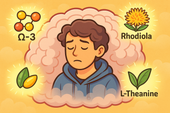
Brain Fog and Body Dysmorphic Disorder: Can Nootropic Supplements Help?
Brain fog often accompanies Body Dysmorphic Disorder, clouding focus and deepening emotional fatigue. Nootropic supplements like L-theanine, Rhodiola, and CoQ10 can help restore mental clarity, balance neurotransmitters, and bring calm energy back to the mind 🌿🧠.
-

How Stress Hormones Like Cortisol May Worsen Body Dysmorphic Disorder
Chronic stress floods the brain with cortisol — the hormone that keeps you on high alert. In Body Dysmorphic Disorder, this chemical overdrive fuels anxiety, distorts self-image, and traps the body in survival mode. Calming cortisol helps restore both peace and perspective 🌿🧠.
-

The Role of Neurotransmitters in BDD—and How Supplements May Help
Neurotransmitters like serotonin, dopamine, glutamate, and GABA shape how people with Body Dysmorphic Disorder perceive themselves. When these brain messengers fall out of balance, perception distorts — but targeted supplements can help restore calm, focus, and emotional regulation 🧠🌿.
-

What Is Body Dysmorphic Disorder? A Deeper Look at the Mind-Body Connection
Body Dysmorphic Disorder (BDD) isn’t just about appearance — it’s about perception. When brain chemistry, trauma, and stress distort self-image, the mind begins to see flaws that aren’t truly there. Healing starts by calming the nervous system and reconnecting mind and body 🪞🧠.
-
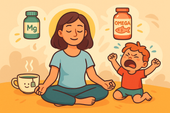
Supplements for Parents Facing Toddler Tantrums: Staying Calm When Little Emotions Run Wild
Toddler tantrums can drain even the most loving parent — but your calm is powerful. With the right supplements like magnesium, L-theanine, and ashwagandha supporting your nervous system, you can stay patient, grounded, and kind, even when emotions run high 🧸🌿.
-

Workplace Stress and Anger Management Support
Workplace stress can quickly turn into frustration — but calm is a skill you can train. By combining supplements like magnesium, L-theanine, and adaptogens with breathwork and mindset tools, you can stay focused, patient, and emotionally grounded no matter how intense the office gets 💼🌿.
-

How to Stay Patient With Family During Stressful Holidays
Holiday gatherings can stir up old stress and test your patience — but calm is possible. With nervous system support from magnesium, L-theanine, and adaptogens, plus mindful breathing and clear boundaries, you can stay centered, kind, and grounded even when family chaos unfolds 🎄💞.
-

Supplements to Keep Calm During Traffic Jams
Getting stuck in traffic doesn’t have to ruin your mood. With calming supplements like magnesium, L-theanine, and ashwagandha, you can train your body to stay relaxed and focused behind the wheel — turning gridlock into a moment of grounded patience 🚗🌿.
-
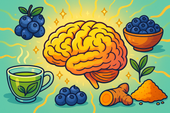
The Role of Antioxidants in Healing Brain Stress from Dissociation
Antioxidants protect the brain from the oxidative stress caused by trauma and dissociation. By neutralizing free radicals and supporting mitochondrial recovery, they help restore clarity, focus, and emotional balance — allowing the mind to heal at the cellular level 🌿🧠.
-
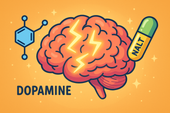
N-Acetyl L-Tyrosine (NALT) for Supporting Mental Clarity
N-Acetyl L-Tyrosine (NALT) fuels dopamine production — the neurotransmitter of focus and motivation. By supporting brain chemistry during stress, NALT helps restore mental clarity, energy, and alertness, making it easier to think clearly and feel present again ⚡🧠.
-

How Ginseng May Improve Focus and Energy in Dissociation
Ginseng helps combat the mental fatigue and fog that often come with dissociation. By supporting mitochondrial energy, balancing neurotransmitters, and regulating cortisol, it gently restores focus, motivation, and emotional presence — helping the mind reconnect with clarity and strength 🌿⚡.
-
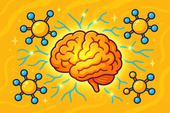
Phosphatidylserine and Dissociation: Supporting Cognitive Function
Phosphatidylserine helps calm the stress response by balancing cortisol, the body’s primary stress hormone. By lowering cortisol spikes, it protects memory, focus, and emotional stability — restoring clarity and mental presence for those struggling with dissociation 🧠🌿.
-
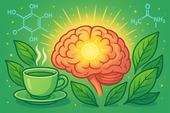
Can Green Tea Extract Help with Dissociative Brain Fog?
Green tea extract may help lift dissociative brain fog by supporting neurotransmitter balance, reducing inflammation, and enhancing energy at the cellular level. With its key compounds EGCG and L-theanine, it promotes calm focus, clarity, and emotional presence — helping you feel more alert and grounded 🍵🧠.
-
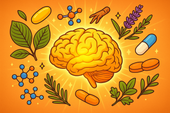
Building a Natural Supplement Stack for Dissociation Support
Building a supplement stack for dissociation means nourishing the brain and body back into communication. By supporting neurotransmitters, gut health, and energy balance through nutrients like magnesium, omega-3s, curcumin, and probiotics, you can help restore clarity, calm, and connection — one layer at a time 🌿🧠.
-

Chamomile and Lavender for Dissociative Anxiety Relief
Chamomile and lavender work together to calm dissociative anxiety by soothing the nervous system and restoring emotional safety. Their natural compounds balance cortisol, enhance GABA activity, and activate the vagus nerve — helping you feel grounded, connected, and at peace again 🌿💜.
-
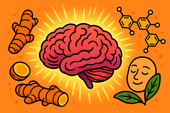
Curcumin for Inflammation and Mental Clarity in Dissociation
Curcumin, the golden compound in turmeric, does more than fight inflammation — it helps clear the mental fog often tied to dissociation. By calming neuroinflammation, balancing neurotransmitters, and supporting mitochondrial energy, curcumin can restore mental clarity, focus, and emotional presence 🌿🧠.
-
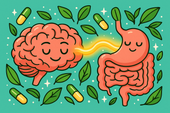
Probiotics and Dissociation: Exploring the Gut–Brain Axis
The gut–brain axis plays a vital role in emotional awareness and presence. When the microbiome is balanced, it supports serotonin production, vagus nerve activity, and calm focus. Probiotics help repair this connection — restoring safety, clarity, and the feeling of truly being in your body again 🌿🧠.
-
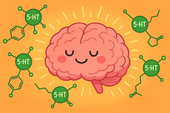
5-HTP for Dissociation: Supporting Serotonin and Emotional Stability
5-HTP helps bridge the gap between emotional numbness and stability by supporting serotonin production — the neurotransmitter that shapes mood, sleep, and sensory awareness. For people experiencing dissociation, 5-HTP may gently restore connection, presence, and emotional balance from the inside out 🌿🧠.

















































